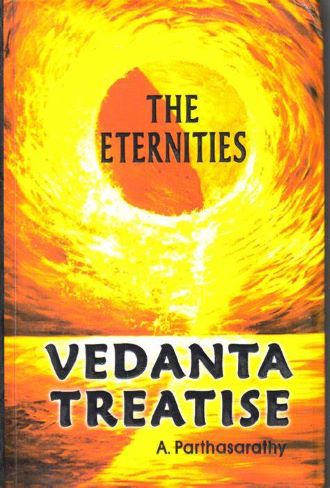Vedanta Treatise: The Eternities
Author : Swami A Parthasarathy
Genre : Philosophy

If there is one religious text I enjoy reading, it is the Vedanta. The ancient religious books of Hindus were the Vedas (knowledge) and at the end of each there was Vedanta (literally the end of knowledge, or more allegorically the highest form of knowledge). They are also called the Upanishads, and their core idea is that the aim of life is self-realization, knowing and becoming one with our true self. Which is not our body, feelings or even intellect. But the godliness inside us, for the self is essentially divine, be you saint or sinner.
These texts are in Sanskrit and, at a shallow level, could just be some stories and shlokas/verses. To appreciate their deeper meaning, one needs commentary from a guide. Parthasarathy’s treatise on Vedanta is one of the best I have come across [other good ones are from Osho, S Radhakrishnan and Eknath Easwaran].

What I love about them is that they are based on rational inquiry and allow us to question instead of following dictums or revealed truths. In fact, Vedanta come out strongly against rituals saying outer rituals need to be replaced by the ritual of introspection. Example, the famous ancient hindu act of horse sacrifice (Ashwamedha Yajna) is revealed as sacrifice of the worldly desires to attain spirituality. The Upanishads even go on to say that those who worship external divinity are the domesticated animals of God. For true divinity is within us. One of the four mahavakyas (Grand Declarations) says Aham Brahma asmi or I am God, the ultimate pronouncement of a self-realized person. This is not blasphemous because we are simply proclaiming the divinity of our immortal self, which is one with everything else in the world, and one with God. In fact, Vedanta calls this world Maya, an illusion. Hanuman when asked how he was related to God, says:
When I consider my body, I am your servant.
When I consider my mind, I am part of you.
But when I consider my (true) Self, you and I are one.
The famous American philosopher, Emerson, also said the same: Every man is a divinity in disguise, a god playing the fool! On the other hand, what is really sacrilegious is reducing religion to fanatic superstitions, violence and hatred in the name of an external God.
Over time, Upanishads have shaped my own thinking in many ways.
Love is not personal, preferential attachment. Pure love has no motive and no desire, and attachment is actually a perversion of love.
True Happiness lies within even if the journey towards this discovery requires great persistence. The world attracts us with its instant pleasures but they are fleeting and soon turn to sorrow. Today’s hedonistic treadmill is ailing much of the developed world. Bhagwad Geeta says (Chapter 18, Verse 37 & 38): True Happiness is like poison in the beginning but nectar in the end. False happiness is like nectar in the beginning but poison in the end. Schopenhauer succinctly said: It (probably) is difficult to find happiness in oneself but it is impossible to find it anywhere else.
The book also introduced me to what is now my favourite poem, Even This Shall Pass Away, probably the ultimate guide to remain peaceful through all the fluctuations of this world.

Vedanta delves deep in the meaning of real renunciation. Vedanta is all about work and Life is defined in sanskrit as anubhava dhara, a stream of experiences. In fact, Swami Vivekananda’s first spiritual advice to a skinny young follower was, “You Will Be Nearer To Heaven Through Football Than Through The Study Of The Bhagwat Geeta!” Renunciation neither means retiring from this world nor abstaining or restricting individual possessions. It is like we have renounced childhood toys, even though there may be times we still play with them with our kids and actually enjoy the experience. So the spirit of renunciation means that our interest has risen to greater heights, we no longer credit those toys with much merit. We still run your family with love, possess property and enjoy the senses, but while going through these experiences, our mind remains anchored in the supreme self within. It’s a state of dispassion and abstraction while being amidst the world, flowing from the knowledge that what we are enjoying is ephemeral and inconsequential.
Why should you read the book: Vedanta teach us the art of living. Unfortunately, people live through their life and learn the technique of living later. No wonder we have so much suffering in the world. Read this (or any book on Vedanta) to espouse your own philosophy of living.
Goodreads Link: Vedanta Treatise The Eternities by A. Parthasarathy | Goodreads

 This information will never be shared with third party
This information will never be shared with third party
Insightful 👍
Yayy nice